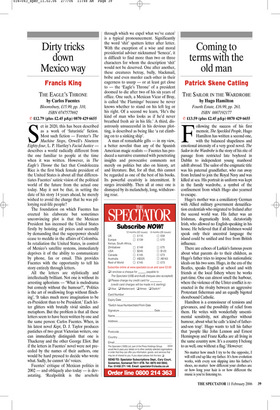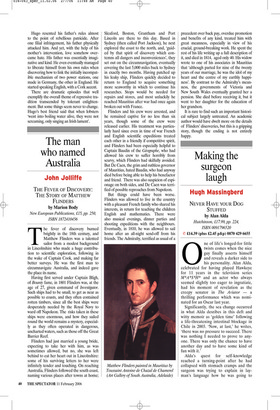Coming to terms with the old man
Patrick Skene Catling
THE SAILOR IN THE WARDROBE by Hugo Hamilton Fourth Estate, £16.99, pp. 263, ISBN 0007192177 V £13.59 (plus £2.45 p&p) 0870 429 6655 Following the success of his first memoir, The Speckled People, Hugo Hamilton has written a second one, with the balanced shapeliness and emotional intensity of a very good novel. The Sailor in the Wardrobe is the story of his rite of passage from restricted late boyhood in Dublin to independent young manhood adrift abroad. The sailor of the enigmatic title was his paternal grandfather, who ran away from Ireland to join the Royal Navy and was killed at sea. His portrait in uniform was kept in the family wardrobe, a symbol of the confinement from which Hugo also yearned to escape.
Hugo’s mother was a conciliatory German with Allied military government denazification credentials who migrated to Ireland after the second world war. His father was an Irishman, dogmatically Irish, dictatorially Irish, who allowed no English-speaking in his house. He believed that if all Irishmen would speak only their ancestral language the island could be unified and free from British influence.
There are echoes of Larkin’s famous poem about what parents do to their children, as Hugo’s father tries to impose his nationalistic ideals on his two sons. Hugo, in the era of the Beatles, speaks English at school and with friends at the local fishery where he works part-time. One can almost smell the harbour, where the violence of the Ulster conflict is reenacted in the rivalry between an aggressive Protestant fisherman and an equally bigoted shorebound Catholic.
Hamilton is a connoisseur of tensions and grievances, and the possibility of relief from them. He writes with wonderfully unsentimental sensitivity, not altogether without humour, about what he calls ‘a kind of fatherand-son trap’. Hugo wants to tell his father that ‘people like John Lennon and Ernest Hemingway and Franz Kafka are all living in the same country now. It’s a country I belong to as well, one without a flag.’ However:
No matter how much I try to be the opposite, I will still end up like my father. It’s how evolution works, with every son slipping into his father’s shoes, no matter how different your clothes are or how long your hair is or how different the music is you’re listening to.
Hugo resented his father’s rules almost to the point of rebellious patricide. After one filial infringement, his father physically attacked him. And yet, with the help of his mother’s intervention, love somehow overcame hate. His father was essentially imaginative and kind. He even eventually managed to liberate himself from his own rules when discovering how to link the initially incompatible mechanism of two power stations, one made in Germany, the other in England. He started speaking English, with a Cork accent.
There are dramatic episodes that well exemplify the overall theme of repressive tradition transcended by tolerant enlightenment. But some things seem never to change. Hugo’s best friend said that when lobsters ‘went into boiling water alive, they were not screaming, only singing an Irish lament’.















































 Previous page
Previous page